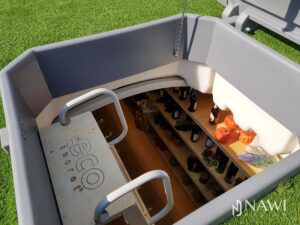
What legal requirements govern the construction of garden cellars?
Admission
Do you dream of your own garden shelter where you can store tools, garden equipment and maybe even create your own little space to relax? Garden cellars are an ideal solution for those who want additional space for storage, work or rest. However, before you start building a cellar, it is important to understand that there are certain legal requirements that must be met. In this article we are going to find out what regulations govern the construction of garden cellars so that we can enjoy them legally and without worry.
Chapter 1: Planning and Permitting
Before we start building a garden cellar, it is worth starting with a thorough planning of the project. It is during this phase that we can avoid many potential problems related to legal requirements. Depending on the location, building laws can vary, so it is necessary to consult with the relevant authorities and obtain the necessary permits. First of all, we will have to address the following issues:
- Zoning and zoning plan: The first step is to check if your land is suitable for the construction of a garden cellar. A zoning plan can specify what structures are allowed in a given area, as well as the minimum distances from the plot boundaries or neighboring buildings.
- Notification or building permit: In some cases, the construction of a cellar may only require the notification of the investment to the relevant authorities. However, in other cases, you may need to obtain formal planning permission. It depends on local regulations.
- Geological and geotechnical surveys: Some areas may be more prone to landslides or other geotechnical problems that can compromise the stability of the construction of the garden cellar. In such cases, in order to create a safe and durable foundation, it is necessary to carry out detailed geological and geotechnical surveys. These studies aim to thoroughly understand the characteristics of the soil on the plot and to determine if there are potential hazards, such as the presence of soft soil layers, groundwater sources, or even erosion actions.
During geological surveys, geologists collect soil samples and analyze them for its mechanical properties, such as strength, mineral composition, and texture. This information is crucial to determine if the land is suitable for basement construction or if it may require special engineering techniques.
Geotechnical surveys go a step further and include the assessment of the bearing capacity of the soil and its response to loads. This allows geotechnical engineers to design suitable foundations and underground structures that will effectively support the garden cellar. These can be various types of solutions, such as piling, the use of special geosynthetic materials or soil reinforcement techniques.
The conclusion of these studies is extremely important because it ensures the safety and durability of the cellar, protecting it from potential geotechnical hazards such as landslides or subsidence. It is worth noting that requiring geological and geotechnical surveys can be a legal burden in some regions, which underlines the importance of this procedure in the construction of garden cellars.
Chapter 2: Building Requirements and Design
Once you’ve obtained the necessary permits and understood your local regulations, it’s time to move on to the design and construction stage of your garden cellar. Let’s remember that every step must be legal. Here’s what to look out for:
- Design and documentation: Prepare a thorough design of the cellar that takes into account all the required parameters, such as size, depth, construction materials, as well as thermal insulation and humidity considerations. Documentation must be complete and comply with local regulations.
- Construction Safety: Make sure that the design takes into account all construction safety standards. This means proper construction of the foundations, walls, roof and access to the cellar.
- Insulation and ventilation: The law may require adequate thermal insulation as well as ventilation systems to prevent moisture and mold problems in the basement.
Chapter 3: Environment and neighbours
When building a garden cellar, it is also important to take care of the surrounding environment and have good relations with neighbors. Here are some things to consider:
- Protecting trees and plants: If there are trees or plants in the vicinity of the cellar, it may be necessary to protect them during construction to avoid root damage or other damage.
- Neighbors and aesthetics: Make sure that the design of the cellar will not compromise the privacy or aesthetics of neighboring lots. Good relations with your neighbours are crucial, so it is worth consulting them and taking their comments into account.
Conclusion
Building a garden cellar can be a fascinating project, but it is important to remember that there are legal requirements that must be met. Whether you’re planning a modest cellar to store your tools or an expansive space to work or relax, it’s always a good idea to start by consulting with local authorities and obtaining the necessary permits. In this way, you will be able to enjoy your garden cellar fully legally and without any worries.
Keep in mind that laws can vary from region to region, so it’s always a good idea to consult with local authorities and building law specialists to avoid any misunderstandings or hassle during the project. Building a garden cellar can be a rewarding experience, and meeting the legal requirements will give you peace of mind that your project is compliant.




